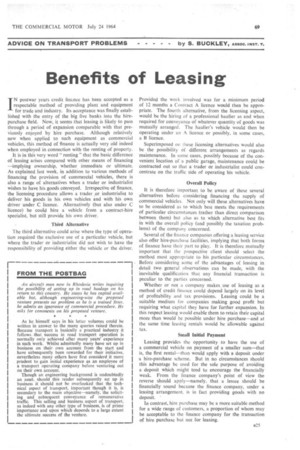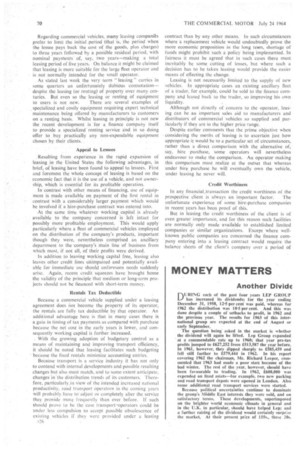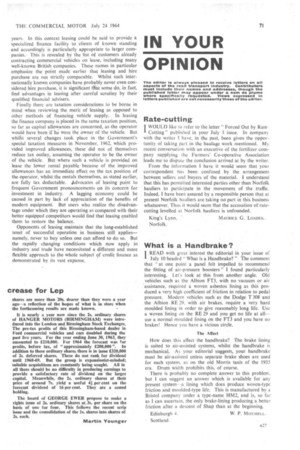Benefits of Leasing
Page 71

Page 72

Page 73

If you've noticed an error in this article please click here to report it so we can fix it.
IN postwar years credit finance has been accepted as a respectable method of providing plant and equipment for trade and industry. Its acceptance was finally established with the entry of the big five banks into the hirepurchase field. Now, it seems that leasing is likely to pass through a period of expansion comparable with that previously enjoyed by hire purchase. Although relatively new when applied to such equipment as commercial vehicles, this method of finance is actually very old indeed when employed in connection with the renting of property.
It is in this very word" renting" that the basic difference of leasing arises compared with other means of financing —implying ownership, whether immediate or ultimate. As explained, last week, in addition to various methods of financing the provision of commercial vehicles, there is also a range of alternatives when a trader or industrialist wishes to have his goods conveyed. Irrespective of finance, the licensing procedure allows a trader ,or industrialist to deliver his goods in his own vehicles and with his own driver under C licence. Alternatively (but also under C licence) he could hire a vehicle from a contract-hire specialist, but still provide his own driver.
Third Alternafive The third alternative could arise where the type of operation required the exclusive use of a particular vehicle, but where the trader or industrialist did not wish to have the responsibility of providing either the vehicle or the driver. Provided the work involved was for a minimum period of 12 months a Contract A licence would then be appropriate. The fourth alternative, from the licensing aspect, would be the hiring of a professional haulier as and when required for conveyance of whatever quantity of goods was mutually arranged. The haulier's vehicle would then be operating under an A licence or possibly, in some cases, a B licence.
Superimposed on these licensing alternatives would also be the possibility of different arrangements as regards maintenance. In some cases, possibly because of the convenient location of a public garage, maintenance could be contracted out so that a trader or industrialist could concentrate on the traffic side of operating his vehicle.
Overall Policy It is therefore important to be aware of these several alternatives before considering financing the supply of commercial vehicles. Not only will these alternatives have to be considered as to which best meets the requirements of particular circumstances (rather than direct comparison between them) but also as to which alternative best fits in with the overall policy (and possibly the taxation problems) of the company concerned.
Several of the finance companies offering a leasing service also offer hire-purchase facilities, implying that both forms of finance have their part to play. It is therefore mutually important that the prospective client should select the method most appropriate to his particular circumstances. Before considering some of the advantages of leasing in detail two general observations can be made, with the inevitable qualification that any financial transaction is peculiar to the parties concerned.
Whether or not a company makes use of leasing as a method of credit finance could depend largely on its level of profitability and tax provisions. Leasing could be a suitable medium for companies making good profit but requiring what capital they have for further expansion. In this respect leasing would enable them to retain their capital more than would be possible under hire purchase—and at the same time leasing rentals would. be allowable against tax.
Small Initial Payment Leasing provides the opportunity to have the use of a comMercial vehicle on payment of a smaller sum—that is, the first rental—than would apply with a deposit under a hire-purchase scheme. But in no circumstances should this advantage be used for the sole purpose of avoiding a deposit which might tend to encourage the financially weak. From the finance company's point of view the reverse should apply—namely, that a lessee should be financially sound because the finance company, under a leasing arrangement, is in fact providing goods with no deposit. '
In contrast, hire purchase may be a more suitable method for a wide range of customers, a proportion of whom may be acceptable to the finance company for the transaction of hire purchase but not for leasing.
Regarding commercial vehicles, manly leasing companih prefer to limit the initial period (that is, the period when the lessee pays back the cost of the goods, plus charges) to three years followed by a possible residual period, with nominal payrnents of, say, two years—making a total leasing period of five years. On balance it might be claimed that leasing is more suitable for the large fleet operator and is not normally intended for the small Dperator. .•
As stated last week the very term " leasing" carries in some quarters an unfortunately dubious connotation— despite the leasing (or renting) of property over many centuries. But even so the leasing or renting of equipment
to users is not new. There are several examples of _specialized and costly equipment requiring expert technical maintenance being offered by manufacturers to customers on a renting basis. Whilst leasing in principle is not new the recent development is for a finance company itself to provide a specializedrenting service and in so doing offer to buy practically any non-expendable equipment chosen by their clients.
Appeal to Lessees
Resulting from experience in the rapid expansion of leasing in the United States the following advantages, in brief, of leasing have been found to appeal to lessees. First and foremost the whole concept of leasing is based on the economic fact that it is the use of a vehicle, and not ownership, which is essential for its profitable operation.
In contrast with other means of financing, use of equipment is made available on payment of the first rental in contrast with a considerably larger payment which would be involved if a hire-purchase contract was entered into.
At the same time whatever working .capital is already available to the company concerned is left intact for possibly more profitable employment. This would apply particularly where a fleet of commercial vehicles employed on the distribution of the company's products, important though they were, nevertheless comprised an ancillary department to the -company's 'Main line of business from which most, if not all, of their profits were derived.
In addition to leaving working capital free, leasing also leaves other credit lines unimpaired and potentially available for immediate use should unforeseen needs suddenly arise. Again, recent credit squeezes have brought home the validity of the principle that medium or long-term projects should not be flounced with short-term money.
Rentals Tax Deductible Because a commercial vehicle supplied under a leasing agreement does not become the property of its operator, the rentals are fully tax deductible by that operator. An additional advantage here is that in many cases there is a gain in timing of tax payments as compared with purchase because the net cost in the early years is lower, and consequently working capital is further increased.
With the growing adoption of budgetary control as a means of maintaining and improving transport efficiency, it shOuld be noted that leasing facilitates such budgeting because the fixed rentals minimize accounting entries.
Because transport is a service industry. it has not only to contend with internal developments and possible resulting changes but also must match, and to some extent anticipate, changes in the distribution trends of its customers. Therefore, partieularly,in.view of the intended increased national productivity, road transport operators in the coming years will probably, have to' adjust or completely alter the service they provide more frequently than ever before. If such should prove to be the case transport•operators could be under leSs compulsion to accept possible obsolescence of existing vehicles if they were provided under a leasing contract than by -any other means. In such circumstances where a replacement vehicle would undoubtedly prove the more economic proposition in the long teem, shortage of funds might prohibit 'such a policy being implemented. In fairness it must be agreed that in such cases there must inevitably be some cutting of losses, but where such a decision has to be taken leasing would provide the easier means of effecting the change.
Leasing is not necessarily limited to the supply of new vehicles. • In appropriate cases an existing ancillary fleet of a trader, for example, could be sold to the finance company and ]eased back to the trader, so improving his own liquidity.
Although not directly of concern to the operator, leasing can be an important sales aid to manufacturers and distributors of commercial vehicles so supplied and particularly if they are in the higher price range.
Despite earlier comments that the prime objective when considering the merits of leasing is. to ascertain just how appropriate it would be to a particular set, of circumstances, rather thana direct comparison with the alternative of,. say, hire purchase, some operators will nevertheless endeavour to make the comparison. An operator making this comparison must realize at the outset that whereas under hire purchase he will eventually own the vehicle, under leasing he never will.
Credit Worthiness In any financial.transaction the credit worthiness of the prospective client is always an important factor. The unfortunate experience of some hire-purchase companies in recent years has been proof of this.
But in leasing the credit worthiness of the client is of even greater importance, and for this reason such facilities are normally only made .available to established limited companies or similar organizations. Except where wellknown public companies are concerned. the finance company entering into a leasing contract would require the balance sheets of the client's company over a period of years. In this context leasing could be said to provide a specialized finance facility to clients of known standing and accordingly is particularly appropriate to larger companies. This is revealed by the list of customers already contracting commercial vehicles on lease, including many well-known British companies. These names in particular emphasize the point made earlier that leasing and hire purchase are not strictly comparable. Whilst such internationally known companies have probably never even considered hire purchase, it is significant that some do, in fact, find advantages in leasing after careful scrutiny by their qualified financial advisers.
Finally there are taxation considerations to be borne in mind when reviewing the merit of leasing as opposed to other methods of financing vehicle supply. In leasing the finance company is placed in the same taxation position, so far as capital allowances are concerned, as the operator would have been if be were the owner of the vehicle. But whilst several changes took place in the Government's special taxation measures in November, 1962, which provided improved allowances, these did not of themselves reduce tax outlay, assuming the .operator to be the owner of the vehicle. But where such a vehicle is provided on lease the lower rental payable because of the improved allowances has an immediate effect on the tax position of the operator, whilst the rentals themselves, as stated earlier, are fully tax deductable. Advocates of leasing point to frequent Government pronouncements on its concern for investment in industry. A lagging economy could be caused in part by lack of appreciation of the benefits of modern equipment. But users who realize the disadvantage under which they are operating as compared with their better equipped competitors would find that leasing enabled them to restore the balance.
Opponents of leasing maintain that the long-established tenet of successful operation in business stilt applies— namely, never to buy unless one can afford to do so. But the rapidly changing conditions which now apply in industry and trade have necessitated a different and more flexible approach to the whole subject of credit finance as demonstrated by its vast expanse.
















































































































